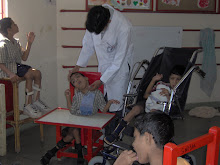Not all Children with autism are mentally retarded however, it is said that between 75% and 90% of all autistics are mentally retarded. To be diagnosed with mental retardation, one must generally show significant impairment in adaptive living skills and have an IQ under 70 as measured by a standardized IQ test. At the same time, advertisements by certain autism awareness sites proclaim that geniuses such as Albert Einstein, Isaac Newton and Thomas Edison may have had forms of Autism. In order to understand this seeming paradox and to help both parents and dentists keep realistic expectations from an autistic child it is important for us to understand the term "Autistic Spectrum" and the disorders classified under it.
At the same time that Leo Kanner described autism in American children, a German scientist, Dr. Hans Asperger, described a milder form of the disorder that became known as Asperger syndrome. Thus these two disorders were described and are today listed in the Diagnostic and Statistical Manual of Mental Disorders DSM-IV-TR (fourth edition, text revision) as two of the five pervasive developmental disorders (PDD), more often referred to today as autism spectrum disorders (ASD). All these disorders are characterized by varying degrees of impairment in communication skills, social interactions, and restricted, repetitive and stereotyped patterns of behavior.
Disorders such as Aspergers syndrome may result in individuals who, in spite of their social awkwardness, may have an extraordinary intelligence in other fields such as numbers. However the sad truth is that most children diagnosed with childhood autism will have some form of mental impairment. This is even more so in India where the cases with milder forms of autism often go undiagnosed.
Irrespective of their IQ, patients with autism will have some difficulty in communication and therefore it is imperative that both the dentist and parent prepare themselves for a dental visit
See Also
Preparing your Child for a Dental Visit
Preparing to treat an autistic child
For a detailed description of childhood autism you can download the following booklet, put forward by the national institute of mental health.







